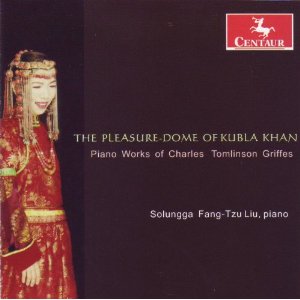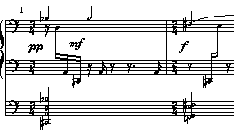Article first published as Music Review: Solungga Fang-Tzu Liu – The Pleasure Dome of Kubla Khan: Piano Works on Blogcritics.
Also featured at seattlepi.com…
 Perhaps my readers will not be too familiar with enigmatic classical composer Charles Tomlinson Griffes (1884-1920). This comes as no surprise, because though Griffes was a brilliant Impressionist composer with a unique musical language, he only composed a handful of pieces during his short life. He could count among his influences French Impressionism, contemporary European music with its bitonality and tonal ambiguity, and Asian music, a compositional influence that was relatively new at the time. His music is therefore a dynamic and distinct blend of these influences: one hears something of Scriabin and Debussy in music such as the set Three Tone Pictures (1910-1912) or the simply titled Sonata (1917-1919), tied with this undercurrent of Oriental exoticism that makes his work so unique.
Perhaps my readers will not be too familiar with enigmatic classical composer Charles Tomlinson Griffes (1884-1920). This comes as no surprise, because though Griffes was a brilliant Impressionist composer with a unique musical language, he only composed a handful of pieces during his short life. He could count among his influences French Impressionism, contemporary European music with its bitonality and tonal ambiguity, and Asian music, a compositional influence that was relatively new at the time. His music is therefore a dynamic and distinct blend of these influences: one hears something of Scriabin and Debussy in music such as the set Three Tone Pictures (1910-1912) or the simply titled Sonata (1917-1919), tied with this undercurrent of Oriental exoticism that makes his work so unique.
It is precisely this composer whom Taiwan-born concert pianist Solungga Fang-Tzu Liu has decided to showcase. The Pleasure-Dome of Kubla Khan, released on Centaur Records, features a selection of Griffes’s most notable solo piano works. Liu, currently Assistant Professor of Piano at Bowling Green State University, is known as a dedicated performer of 20th-21st century music. In addition to her performances of Ravel and Prokofiev, she has many premieres and recordings of composers to her name, such as Steve Reich, Gregory Mertl, and Robert Morris. In this latest recording of hers, Liu takes the listener through a sensory experience not unlike an ornate tapestry of sound.
Read more at blogcritics.org…


 The Frederick’s Historical Piano Collection, which supports this concert series, is a gem for classical music aficionados and the general public alike. Maintained by Patricia and Edmund Michael Frederick, this Center is a wealth of resources, mainly concentrated in their wonderful collection of over twenty early grand pianos. A main feature is their Historical Piano Concerts, a concert series featuring internationally renowned pianists performing works on selected pianos of the collection. The pianos are determined by program choice: if the pianist chooses to focus on Chopin, then the piano of choice is the 1840 Erard. If the pianist chooses to focus on piano literature by Mendelssohn, then the Tröndlin (c. 1839) might be a good choice. Performers like Junghwa Lee painstakingly research and practice, adjusting their own techniques to accommodate the often more delicate touches of these pianos. One cannot simply pound away on these pianos, sturdy as they are. Sometimes a more subtle technique is required.
The Frederick’s Historical Piano Collection, which supports this concert series, is a gem for classical music aficionados and the general public alike. Maintained by Patricia and Edmund Michael Frederick, this Center is a wealth of resources, mainly concentrated in their wonderful collection of over twenty early grand pianos. A main feature is their Historical Piano Concerts, a concert series featuring internationally renowned pianists performing works on selected pianos of the collection. The pianos are determined by program choice: if the pianist chooses to focus on Chopin, then the piano of choice is the 1840 Erard. If the pianist chooses to focus on piano literature by Mendelssohn, then the Tröndlin (c. 1839) might be a good choice. Performers like Junghwa Lee painstakingly research and practice, adjusting their own techniques to accommodate the often more delicate touches of these pianos. One cannot simply pound away on these pianos, sturdy as they are. Sometimes a more subtle technique is required.
